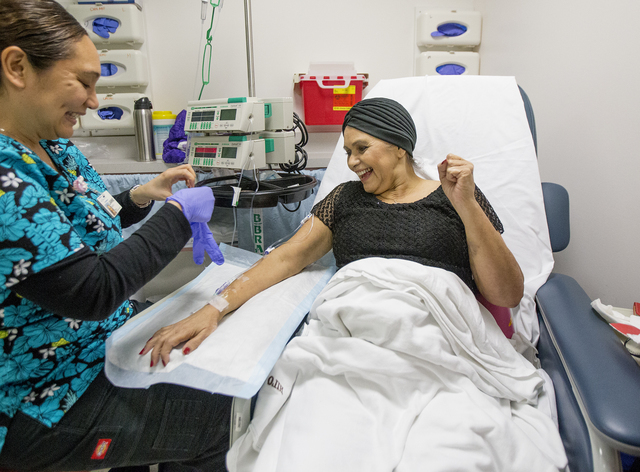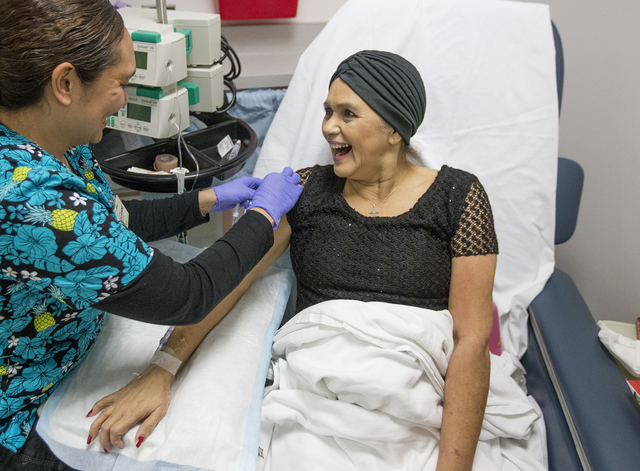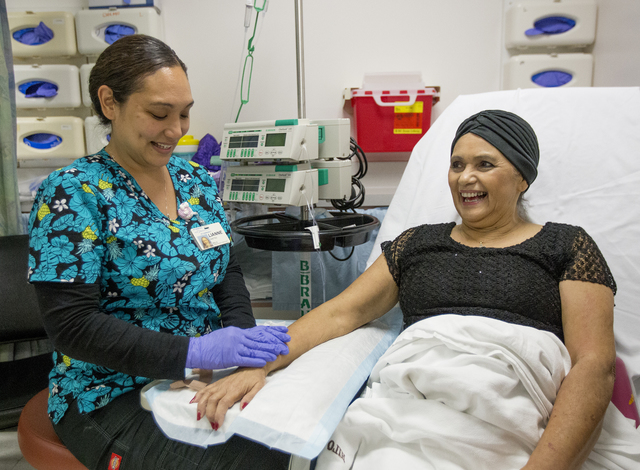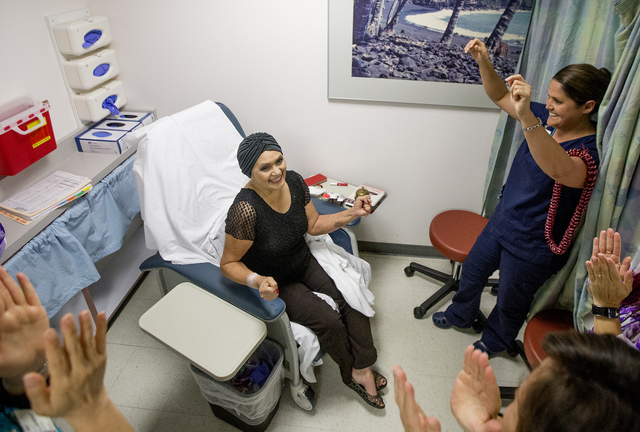‘It’s like the whole world collapses’: A cancer patient’s tale of survival
It started as a hacking cough that wouldn’t go away. Then, one day, Elaine Christian was swimming her usual 3,600 yards in the pool — but her endurance dwindled after only a portion. Eventually, she began coughing up blood.
ADVERTISING
“That was the sign,” Christian, 64, said. “I knew something was wrong.”
Doctors thought pneumonia at first. Then, the tests came back — it was much worse. Small-cell lung cancer, she was told, which is a deadly, aggressive form of the disease. Christian and her husband, Leo, were crushed.
“It was just really devastating,” she said. “To the point of, ‘Oh my gosh, how am I going to handle this?’ But you know, you handle it. You handle it because you’ve got to.”
“It’s like the whole world collapses,” her husband, Leo, added. “When you’ve been with someone for so long, it’s just catastrophic. Your world drops for a little while, and you pick it back up and put the pieces back together.”
Christian’s a petite woman with a big zest for life. She has a contagious laugh that fills the room and warm presence which effortlessly draws people in.
Her family and friend circle is also robust, which she said has helped her maintain a buoyant spirit during the five months of radiation and chemotherapy treatments, even when things got really difficult, such as the day her long, dark hair first began falling out, or during those bad bouts of nausea and debilitating fatigue.
Christian was a teacher in Hilo for decades. In recent years, she was happily enjoying retirement. Just prior to her diagnosis, she had plans to visit her daughter more often, who lives in Reno, Nevada. She was an avid swimmer who devoted hours each day to pool laps. Cancer was never in the plan.
“You’ve got to take what you got dealt and deal with it,” Christian said. “But it’s not easy at all, especially when it takes it out of you. For someone like me, who is an independent person and always on the go and always moving around, it’s a tough thing to accept when my lifestyle changed and I’ve had to (rely) on my husband for things — it’s been really hard.”
Information from the American Cancer Society shows five-year survival rates for small-cell lung cancer wane between 2 percent to 31 percent, depending on how early the cancer is caught. Christian is hopeful for a cure. Without treatment, doctors gave her six months. With treatment, even if she is not cured, doctors hope treatment can give her more time.
“You have to think about how things are going to be if you don’t make it,” she said. “And you don’t want to, but you’re human and you’re facing the possibility of it being terminal. So I had (final arrangements) set to go, in case anything happened. And that was tough to do, but once I made all those decisions, I said, ‘OK, I’m done. I’m going to fight it now, and fight it as best I can.’ And that’s what I did, and hopefully that’s been enough to get through it.”
February is National Cancer Prevention Month and small-cell lung cancer is a disease which people can take measures to help prevent. Christian smoked for many years and encourages others to quit — or not start at all. The Cancer Society lists tobacco smoking as one of the primary risk factors for lung cancer.
“Smoking (is correlated) with lung cancer for sure, and just about everything else,” said Julie Leach, nurse manager at the Hawaii Pacific Oncology Center in Hilo. “It’s a double whammy. It’s carcinogen, and on top of that, it breaks down your immune system, by destroying the ability of your immune system to surveil your body.”
Christian underwent treatment at the Hilo cancer center, which was founded in the 1990s by now-retired radiation oncologist James Lambeth and his wife, Phoebe. The center is small but robust — it currently has one medical oncologist, two radiation oncologists and soon will have two nurse practitioners. It sees about 100 patients per day and offers an array of cancer treatments, minus a few, such as transplants and clinical trials.
But even that’s changing. Within a couple years, the center plans to begin adding clinical trials, which are research studies patients can undergo to try new treatment options. These days, center officials said, very few patients are sent to Oahu or the mainland for treatment.
“When people do go to Honolulu — and they do excellent care — it’s just a lot of time traveling or staying with family,” said Kevin Wilcox, a radiation oncologist at the cancer center. “And there’s an immeasurable but large benefit to being in your own home. I tell patients, it’s good to have your own remote, your own toilet, your own cat outside chasing the bird every day — just your routine.”
For Christian and her husband, much of the future lies in results of a scan scheduled in March, which will determine the status of her cancer. Meanwhile, she’s not going to stop living life. She’s planning future trips to see her daughter, and going forward, she and Leo, who celebrated their 25th wedding anniversary in November, have vowed to spend more time together.
“For the next 25, years we’re going to be together,” she said. “We’re going to do things we’ve always wanted to do. Do we have plans? Of course, but what’s really important now is, you realize that all the little stuff, materialistic stuff, doesn’t matter anymore. Your family matters, I’ve got grand nieces and nephews I want to see more and spend more time with my daughter.”
“I’ve got to just stay positive,” she continued. “Because otherwise it eats away at you, and that’s not something you want to have happen.”
Email Kirsten Johnson at kjohnson@hawaiitribune-herald.com






